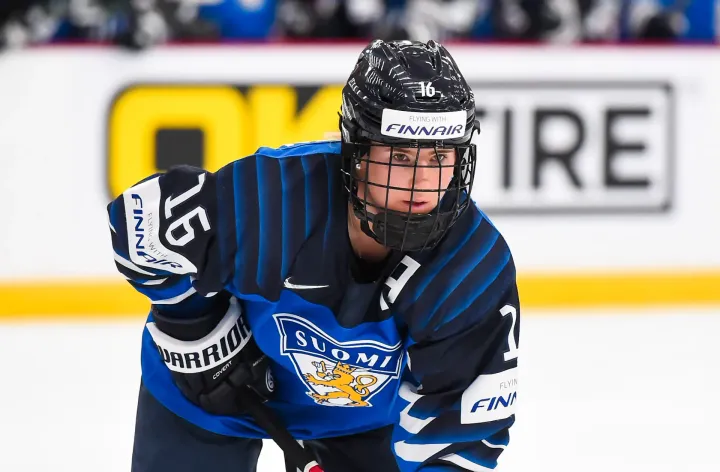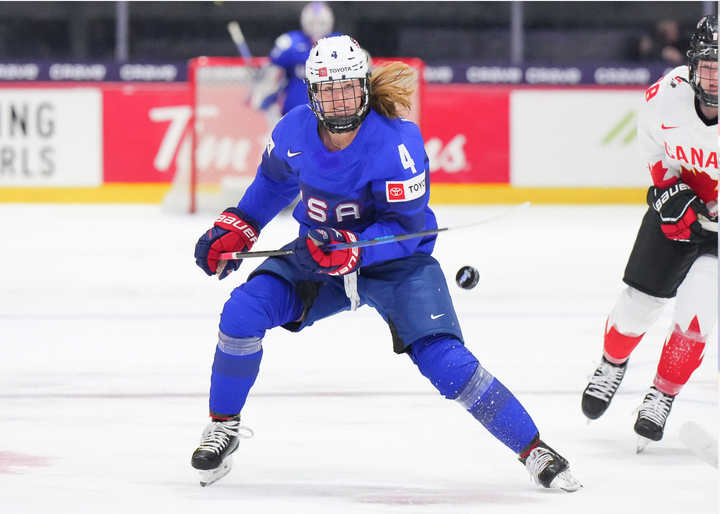Kunlun Red Star first step in growing hockey in China
KRS women’s club is just one move in China’s attempt to grow the game at home and abroad.
On Monday it was announced that the Chinese Kunlun Red Star were joining the CWHL, but Digit Murphy is thinking bigger.
Murphy, a former coach with USA Hockey and the CWHL prior to her hiring with KRS, oversaw an exposure camp in Toronto’s Mastercard Centre Tuesday with a two-fold intention: to show North American girls and women that there is a club and national team that needs players as well as to evaluate the pool of Chinese and ethnic-Chinese skaters. She was hired in February to not only coach KRS in the CWHL but also to recruit talent in order to win a medal in women’s hockey at the 2022 Beijing Winter Olympics, a goal she believes will be fulfilled.
Unlike Hockey Canada or USA Hockey, KRS is a direct line to the national team, thus KRS joining the CWHL is not just about exposure in Canada, but around the world.
“The thing that really jazzes me is [Hockey China] thinks with vision and that’s what we need to disrupt [old ways of thinking],” she says. “To have China thinking globally about a sport as opposed to just nationalistically, is incredible. They’re using hockey to build relationships with countries. Let’s use sport as that magic elixir. That’s why I’m involved.”
The initiative has got more than her interest piqued. On the men’s side, Mike Keenan -- winner of a Stanley Cup, Canada Cup, and the KHL’s Gagarin Cup -- has been tasked with a similar role, right down to coaching on the bench next season in Shenzhen, China.
“This is the biggest project in hockey in the world,” he says.
The east-Asian country has about 1.3 billion people but just over 3,000 playing hockey (with only about 300 of those being women.) While Murphy is thinking about a medal, Keenan is thinking numbers.
“The objective is to, in five years, have more hockey players playing in China than in any other country in the world,” he says.
Specifically, 500,000 children on skates over that time or 100,000 per year. He says Monday’s press conference held at the Hockey Hall of Fame conveyed that “hockey has arrived in China.”
On Tuesday at the Mastercard Centre, young women and girls came from all over North America with California, Colorado, Wisconsin, New Jersey, Albany NY, Washington D.C., Massachusetts, Richmond B.C., and more represented. All showed up for a two-day camp with varying levels of expectations.
Kunlun RedStar exposure camp beginning now at the Mastercard Center. pic.twitter.com/NLIPQwODEE
— Joe Pack (@JoePack) June 6, 2017
Lisa and her husband brought her three daughters to Toronto from New Jersey. Two skated in the older group (15 and up) while Katie (14) skated early in the morning. All three have been playing hockey for two or three years but found out about the camp through a coach who knew Murphy.
“Digit’s a great inspiration,” says Lisa. “She’s got a lot of ‘umph’ and she’s so happy that this is going on. An outgoing, positive person. She got the girls excited and it shows in their performance.”
The notion that KRS has a vision of recruiting talent to eventually ice an Olympic team, however, is not in the forefront of their minds.
“It’s definitely good experience,” Lisa says. “It’s exposure, it gives them an idea of what it’s really like to be in the big world, and to play almost like NHL-level. I’m even having a good time here, it’s nice to meet new people. I never thought so many Asian girls are interested in hockey.”
Lisa says theirs is virtually the only Chinese family they know in their New Jersey community. Katie’s not sure how long she’ll play hockey. One gets the sense she hasn’t really put much thought into it.
“I think [the skate] went well. Everybody has a lot of skill,” she says.
Murphy ran around the rink throughout the day, evaluating players from her perch, posing for group photos, speaking with a television crew, and consulting with parents.
.@digitmurphy posing with players and giving hell to the media. pic.twitter.com/s0UmqcdJWN
— Joe Pack (@JoePack) June 6, 2017
“When you’re at a certain age (55) and you’re handed this opportunity, you have to be thankful for the privilege of doing this and then just have at it, to really make a difference in the world,” she says. “To grow hockey globally is a gift. When I took the job, and I felt the energy, I knew it was right. My partner said, ‘When you go over there, don’t sign a contract,’ and I did. My almost-sixth sense said this was right.
“I’m impulsive as it is, and as a coach I go with my gut. You live and die by your strengths and mine is my gut.”
She was hired in part due to her connection with Scott MacPherson, a former coach in the NCAA and ECHL as well as NHL scout, who is connected with the KHL where the men’s KRS team currently plays.
Murphy was consulted about which women’s league was best for KRS to join. She chose the CWHL because of the doors it would help open, namely a North American audience and a relationship with the NHL which the women’s teams in Calgary, Montreal, and Toronto have.
Also contributing to the appeal of playing hockey in China are international stars Kelli Stack and Noora Räty, a forward and goaltender from the States and Finland respectively who donned KRS sweaters at the announcement Monday night. To be in compliance with CWHL rules, both will have to be drafted by KRS to officially sign but the league allows players to select which teams they wish to play for (given their need for primary income which the league does not provide) and the expectation is that both will be in China for 2017-18.
And not just as players - KRS will reportedly employ players like Stack and Räty as “sport ambassadors,” promoting the game and helping to train the national team. A girl’s gotta eat, after all, and that’s a long way to move your life and career.
“Those two women have the right philosophy about growing the game,” says Murphy. “That’s who we want on the bus. They don’t have to come over, they want to come over.”
This job for Murphy isn’t only about the next step in her career, it’s about leaving a legacy in China for other coaches and players to pick up on, she says.
Digit Murphy's belief, not a prediction: China's women's hockey will medal in 2022.
— Joe Pack (@JoePack) June 6, 2017
KRS and the other five CWHL teams will both travel to play, with KRS staying in North America for longer periods to visit all five North American cities.
So, how about that flight?
“It’s really not bad,” Murphy says. “It’s a direct flight. I used to drive a bus from Providence, RI to St. Lawrence in a snowstorm. It’s a lot more comfortable flying in a plane.”
And as long as she has the right people on the bus, that plane ride could be a breeze.





Comments ()